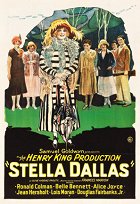Réalisation:
Henry KingScénario:
Frances MarionPhotographie:
Arthur EdesonActeurs·trices:
Ronald Colman, Belle Bennett, Alice Joyce, Jean Hersholt, Lois Moran, Douglas Fairbanks Jr., Vera Lewis, Charles Lane, Ellinor Vanderveer (plus)Résumés(1)
Stella Dallas, the working-class mother who makes the ultimate sacrifice for her socially ambitious daughter, became one of the most resonant figures in American culture from the moment Olive Higgins Prouty’s novel appeared in 1923. A stage adaptation soon followed, as did this film version in 1925 (the first of three). Produced by Samuel Goldwyn and directed by Henry King, the film is a powerful indictment of the rigid class barriers then emerging in the prosperous, postwar America of the 1920s, but the emotional center of the film is Stella (a brilliant portrayal by Belle Bennett, one of 73 actresses tested for the role), who marries ‘above her station’ (to a temporarily embarrassed banker’s son), but is unable to adapt her dress and behavior to bourgeois standards of her new husband. When her daughter becomes engaged to a fashionable country-clubber, Stella’s dilemma becomes painfully clear: Only by leaving her life can she ensure her daughter’s happiness. (Venice International Film Festival)
(plus)
